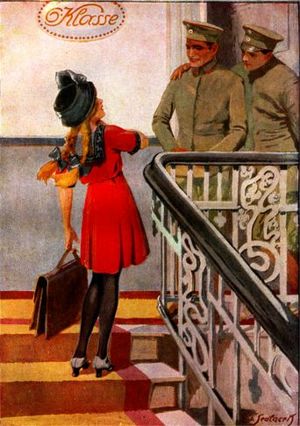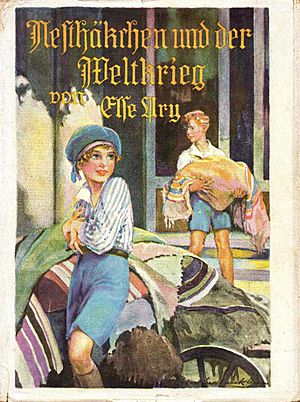Nesthäkchen and the World War facts for kids
 |
|
| Author | Else Ury |
|---|---|
| Original title | Nesthäkchen und der Weltkrieg |
| Translator | Steven Lehrer |
| Illustrator | Robert Sedlacek |
| Country | Germany |
| Language | English |
| Series | Nesthäkchen, volume 4 |
| Genre | Fiction/Adventure |
| Publisher | SF Tafel |
|
Publication date
|
2006 |
| Media type | Print (Trade Paper) |
| Pages | 180 pp (Trade Paper edition) |
| Preceded by | Nesthäkchen in the Children's Sanitorium |
| Followed by | Nesthäkchen's Teenage Years |
Nesthäkchen and the World War is the fourth book in the popular Nesthäkchen series by Else Ury. This book tells the story of Annemarie Braun, a lively German girl, during the early years of World War I (1914-1916). Annemarie is the daughter of a doctor from Berlin. The series follows her life from when she is a baby all the way to old age.
Contents
Annemarie's Wartime Adventures
The story begins with Annemarie's father, Dr. Braun, serving as a medical officer in France during the war. Her mother is stuck in England. Mrs. Braun was visiting her cousin Annie when the war started. She missed her chance to return to Germany. Only some of her letters reach her family.
While her parents are away, Annemarie and her brothers are cared for. Their grandmother, nanny Lena, and cook Hanne look after them. In England, Mrs. Braun is briefly held by authorities. This happens after she talks excitedly about German submarines. She is soon released.
Annemarie's brother Hans brings home a baby. This baby is a refugee from East Prussia. Annemarie is very excited about the child. She names him "Hindenburg" after a famous German general. The baby is later given to the concierge couple and named Max.
Annemarie shows her strong patriotism in many ways. She even sets up a "foreign concept checkout" at home and school. If anyone uses a foreign word, they have to pay a small fine.
A New Girl and a Lesson Learned
A new girl named Vera Burkhard joins Annemarie's class. Vera is from Bukovina and barely speaks German. Annemarie is influenced by older girls. She believes Vera is a Polish spy and an enemy. Annemarie then starts to treat Vera badly.
Annemarie's friends, Margot, Ilse, and Marlene, feel sorry for Vera. But they are afraid to stand up to Annemarie. Annemarie sometimes doubts her actions. However, she doesn't want to admit she is wrong.
Finally, the class teacher shares some important news. Vera's father was killed fighting for Germany. He died a hero in a battle in the Carpathian Mountains. Vera is very sad and upset. But her reputation is now clear. Annemarie feels ashamed of her behavior. She wants to make things right with Vera. From then on, Vera becomes Annemarie's best friend.
Important Lessons During War
Annemarie has other experiences that teach her lessons. She believes a Thai man in her building is an enemy. So, she stops greeting him. Her nanny Lena tells her that being rude is never patriotic.
Annemarie worries her mother is being treated badly in England. She tells her father's doctor friend this. The doctor laughs and says, "The English don’t treat ladies badly, even when they belong to an enemy nation."
One evening, Annemarie prays for Germany to win the war. But then she realizes that French and English children might pray to the same God. She then asks God to be neutral.
When Annemarie refuses to learn French, her teacher gives her good advice. The teacher explains that after the war, people will need to rebuild relationships. Language skills will be very important. The country will need educated young people.
The book ends with Mrs. Braun's unexpected return from England. There is also hope for a peaceful victory. Annemarie seems to have grown up a bit. However, in the next book, she is still her spirited and sometimes spoiled self.
The book's message about war is thoughtful. Even with Annemarie's strong patriotism, Else Ury does not encourage hate. She sees war as a sad event. Peace is shown as the normal and desired state. Ury criticizes Annemarie's bullying of Vera. She calls Annemarie a "silly girl" for her actions.
What is a Backfischroman?
The Nesthäkchen books belong to a German type of novel called a Backfischroman. This means "teenage girl novel." These books were popular between 1850 and 1950. They were written for girls aged 12 to 16.
A "Backfisch" was a young girl, usually between 14 and 17 years old. These novels often showed girls growing up. They learned about society's rules and expectations. The stories usually ended with the heroine getting married. She would then become a Hausfrau, which means a housewife.
Besides Else Ury, other famous Backfischroman authors included Magda Trott and Emmy von Rhoden. Emmy von Rhoden wrote the popular book Der Trotzkopf.
Else Ury originally planned to end the Nesthäkchen series with the sixth book. This book, Nesthäkchen Flies From the Nest, describes Annemarie's marriage. But Ury's publisher received many letters from young fans. They begged for more Nesthäkchen stories. After thinking about it, Ury wrote four more books. She even mentioned her doubts in the seventh book, Nesthäkchen and Her Chicks.
Who was Else Ury?
Else Ury (born November 1, 1877, in Berlin; died January 13, 1943, in the Auschwitz concentration camp) was a German writer. She was best known for her children's books. Her most famous character is Annemarie Braun. Annemarie's life from childhood to old age is told in the ten Nesthäkchen books.
These books became very successful. A six-part TV series called Nesthäkchen was made in 1983. It was based on the first three books. A new DVD edition came out in 2005. Millions of readers and viewers have enjoyed Else Ury's stories.


